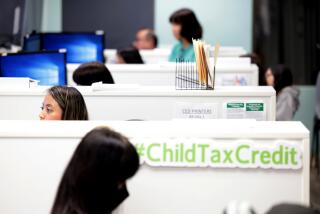RELIGION / JOHN DART : It Pays for Donor to Get a Receipt : IRS: New regulation requires taxpayers to secure documentation for their gifts of at least $250.
- Share via
If generosity or guilt moved you to drop a check for $250 or more into the collection plate during 1994, don’t assume that your canceled check will be enough to satisfy the Internal Revenue Service in the event of an income tax audit.
Before sending their forms to the IRS this year, taxpayers who deduct donations to any charity--religious or not--are required under a new regulation to keep available for review a receipt stating that lump-sum gifts of at least $250 did not include the value of any goods or services received in return.
This is the first year that the law will affect most people, and a sampling of San Fernando Valley religious congregations this week indicated that those connected to major denominations will have little problem supplying contributors with the proper paperwork.
Some concern was expressed, however, for donors to small, independent congregations, which may be unaware of the new requirement.
For example, contributors to the small Cornerstone Christian Church of Northridge have received each year, on request, a computer printout of all their donations the previous year, but the statement labeled them simply “donations,” according to Janet Bowling, a secretary at the 130-member church.
Told in an interview that the IRS now requires wording such as “No goods or services were exchanged for these gifts” for the larger donations, Bowling said, “If that’s the case, we will add that kind of wording. It’s no problem.”
Timeliness is important. If you file your federal income tax forms on, say, Feb. 15 and you receive proof of your philanthropy from a church or temple on March 15, that won’t do. The law requires that you obtain documentation before you file the return.
“This (law) may be a problem for smaller churches that have part-time bookkeepers,” said the Rev. Dan Clark, interim pastor at Encino Presbyterian Church, where computer records of financial giving are made available on a quarterly basis.
The Encino church also tries to provide a backup system of proof for donations by congregants. “We save all our envelopes for a period of two years,” Clark said.
However admirable an anonymous donation in the collection plate might be, parish administrators such as Karen Tibbitts at St. John Baptist de la Salle Catholic Church in Granada Hills discourage it.
“We legally and morally cannot say you contributed some large amount if we have no record of it,” she said.
Tibbitts said computers for the 3,000-family parish will provide a full rundown of all donations during 1994 on statements indicating they were not in return for services or goods.
The new requirement for gifts of $250 or more was requested by Congress to eliminate charitable deductions wrongly claimed. If a person paid $250 to a church or charity to cover the full cost of a conference or trip, for instance, that will not count as a donation.
Mixed gifts are handled differently. Payments of $75 or more that are partly a charitable donation and partly payment for goods and services have to be documented. Thus, if $50 tickets to a church fund-raising concert would normally have been $20 to cover costs, only $30 can be counted by the taxpayer as a charitable deduction.
If the contributor gives an object of value to a church or charity--be it an ice cream machine or computer software--the burden of determining its worth is on the donor.
“The religious organization doesn’t place a value on the gift; the owner is responsible for that,” said Max Lile, director of finance and development for The Church on the Way in Van Nuys. “When it is worth more than $5,000, the owner needs to get an appraisal saying that.”
Those requirements have been in the law before, however.
The newest wrinkle in the tax law, covering individual donations of $250 or more, has been widely publicized with mailings by the IRS to religious organizations, said Keith Kimball, spokesman for the agency’s Los Angeles office.
Indeed, Lile said The Church on the Way has put a notice in its church bulletin twice about the change, reminding donors that they should not file their tax returns until they get the printed statement from the church.
“I bet a lot of people will violate it,” Lile said.
Church administrators noted that most people donate money in amounts smaller than $250, and that the change in the law does not apply to them, regardless of how high their accumulated contributions were for the year.
However, some congregants tithe--donating 10% of their income--and may send large checks to their churches monthly instead of dropping weekly donations into a collection plate.
At the large Adat Ari El Synagogue in North Hollywood, where money is raised for a variety of religious purposes, office volunteer Julius Schlesinger said the new IRS requirement “has given us a lot of work.”
Money contributed for membership dues, the building fund and other special projects will be documented in individualized computer printouts, Schlesinger said. But receipts for donations to reduce the synagogue deficit and to build an endowment fund are being written manually, he said.
Schlesinger devised a form which says, in part: “We thank you for your contribution to our congregation in the amount of (--) dollars. We have not provided you with any goods or services in exchange for this contribution other than intangible religious benefits . . . “
The last expression conforms to IRS terminology and, unofficially, to an acknowledgment of government neutrality on spiritual matters.
More to Read
Sign up for Essential California
The most important California stories and recommendations in your inbox every morning.
You may occasionally receive promotional content from the Los Angeles Times.













